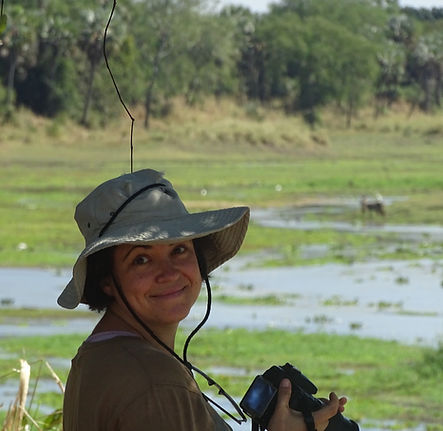

About Us
Combining compassion and science to advance primate conservation in West Africa
The researchers affiliated with PRIMACTION form a multidisciplinary network of experts working across conservation biology, genetics, ecology, anthropology, and science communication. They are united by a shared commitment to protecting primates and their habitats in West Africa through collaborative research, capacity building, and engagement with local communities and decision-makers.
Os investigadores afiliados à PRIMACTION formam uma rede multidisciplinar de especialistas que trabalham nas áreas de biologia da conservação, genética, ecologia, antropologia e comunicação de ciência. Estão unidos por um compromisso comum de proteger os primatas e os seus habitats na África Ocidental através de investigação colaborativa, reforço de capacidades e envolvimento com comunidades locais e decisores.

Our Story
PRIMACTION began in 2018 with the launch of the project “Protecting the western chimpanzee and other primates from illegal hunting and logging in Guinea-Bissau.” It arose from the observation that researchers working on primate conservation in West African countries — particularly in Guinea-Bissau — rarely had opportunities to share their scientific findings with local communities and the wider public.
This was especially true for conservation genetics studies, whose results — for example, arguments to increase connectivity between populations or protect populations with low effective population sizes — were typically published in scientific journals but seldom disseminated to society or local stakeholders, rarely understood by the public, and not frequently translated into national conservation policies.
PRIMACTION was created to help bridge this gap, fostering collaboration among researchers, conservationists, and local partners, and promoting applied research, capacity building, and innovative communication strategies. Over time, it has grown into a regional platform for knowledge exchange and coordinated action to strengthen primate conservation across West Africa.
A PRIMACTION teve início em 2018 com o lançamento do projeto “Proteger o chimpanzé-ocidental e outros primatas da caça e exploração ilegal de madeira na Guiné-Bissau.” A plataforma surgiu da constatação de que os investigadores que trabalham na conservação de primatas em países da África Ocidental — em particular na Guiné-Bissau — raramente têm oportunidades de partilhar os seus resultados científicos com as comunidades locais e com o público em geral.
Isto era especialmente evidente no caso dos estudos de genética da conservação, cujos resultados — por exemplo, argumentos para aumentar a conectividade entre populações ou proteger populações com tamanhos efetivos reduzidos — eram geralmente publicados em revistas científicas, mas pouco divulgados à sociedade ou aos atores locais, raramente compreendidos pelo público e poucas vezes traduzidos em políticas nacionais de conservação.
A PRIMACTION foi criada para colmatar esta lacuna, promovendo a colaboração entre investigadores, conservacionistas e parceiros locais, e incentivando a investigação aplicada, o reforço de capacidades e estratégias inovadoras de comunicação. Com o tempo, evoluiu para uma plataforma regional de intercâmbio de conhecimento e ação coordenada, com o objetivo de reforçar a conservação de primatas em toda a África Ocidental.
Meet The Team
I am a conservation biologist working primarily in Africa. My research focuses on mammals, using genetic and genomic tools to explore the patterns and processes that have shaped animal diversity across the African continent
Research assistant specializing in the collection of geo-referenced biological and social data, with a strong interest in advancing biodiversity conservation and the sustainable use of natural resources in Guinea-Bissau.
I am a population geneticist working primarily in Africa. My research focuses on mammals, using genetic and genomic tools to explore the patterns and processes that have shaped animal diversity across the African continent
Our Funders













